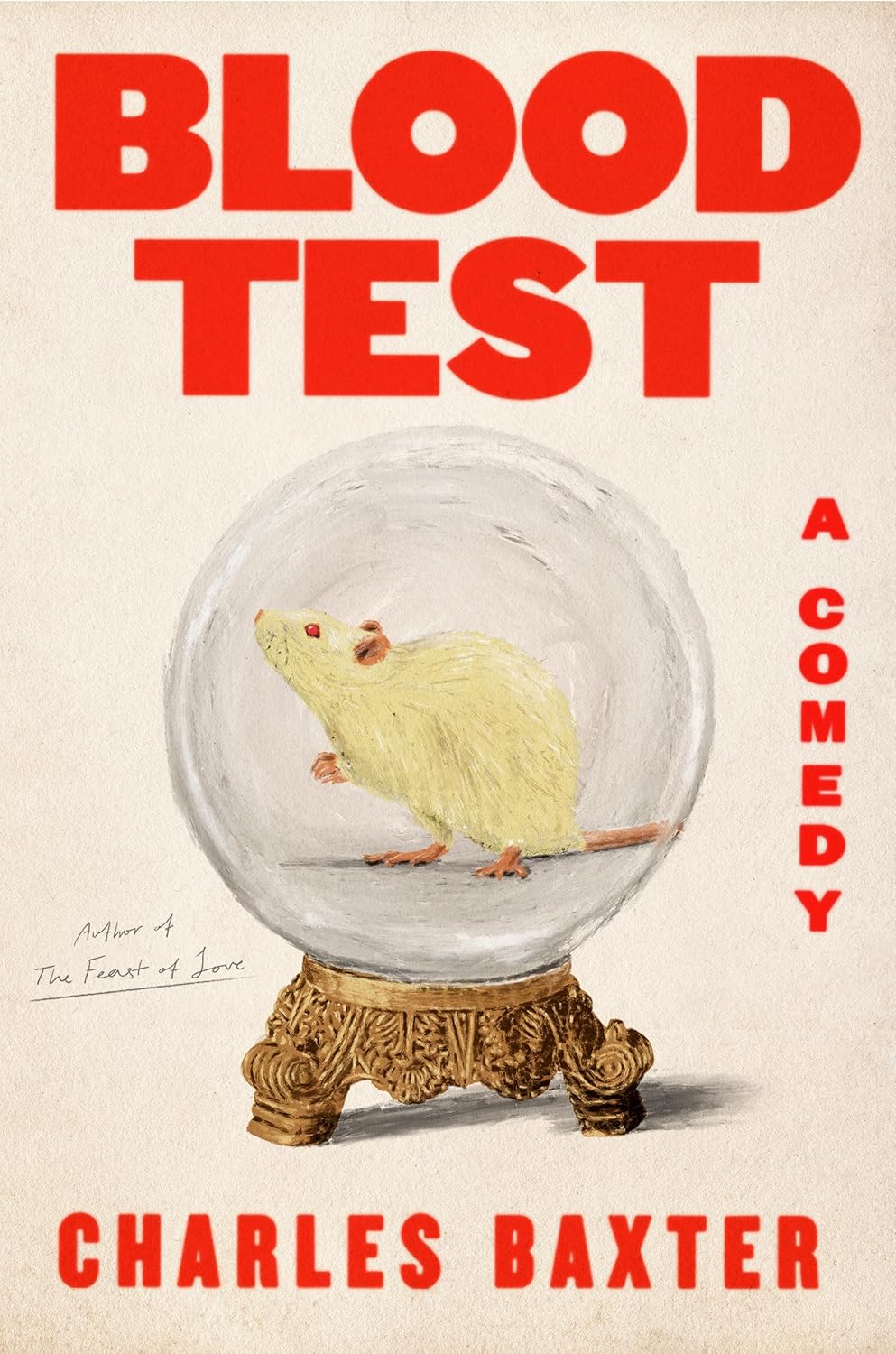Blood Test: A Comedy
- By Charles Baxter
- Pantheon
- 224 pp.
- Reviewed by Deidre Swesnik
- November 15, 2024
Would you want to know you’re about to become a menace to society?

Is it moral to make money predicting what someone may or may not do? Insurance salesman Brock Hobson does it for a living. A man devoted to routine, he hasn’t worried about the future or seen it as much of a mystery. Until now.
Charles Baxter’s latest novel, Blood Test, takes place at a time when America’s future feels particularly uncertain: Do you wear a mask? A MAGA hat? Are you vaccinated? No real-life politicians are mentioned by name, but it’s clear we’re in early 2020s Ohio (veiled references to Cambridge Analytica, “A Prairie Home Companion,” QAnon, and more round out the picture).
Protagonist Brock describes his fictional city like this:
“We have a lot of near-dead people in these parts…It’s probably the postindustrial air we breathe here, or maybe the nitrate-scented water we drink out of the tap. Could be herbicides we spray on everything or the fact that a third of the town has a drinking problem, and another third is on meth and/or Oxy. You fall down here in Kingsboro, Ohio, you’re in good company. It’s a grand party of the infirm down there on the ground. A healthy person over the age of twenty-five acquires a certain charisma in this locale.”
Our hero is that healthy person, or so he thinks. The self-proclaimed “‘straight’ white Sunday school teacher” is divorced, has a girlfriend, and lives with his two teenaged kids. He’s always followed the rules (and cooks meatloaf for seemingly every meal referenced in the story). In high school, he was voted most likely to become a parole officer. As his daughter tells him, “You’re as predictable as a metronome.”
But things start to change when Brock goes to the doctor, complaining of a stabbing pain in his side. She says it’s possibly sciatica or diverticulitis and that it may be stress-related. (If you aren’t stressed, you aren’t paying attention, the author is apparently suggesting.) The doctor adds that Brock might be interested in a new test being offered through the hospital that’s purported to predict your future actions via a simple blood draw. It’s speculative, of course, and costs $2,000.
“Maybe I should have been more careful, done a bit of research first,” Brock thinks, “but I’ve always been curious about what I was about to do.” So, he goes for it.
As readers wait along with him for the results, we learn that his life is intertwined with his ex-wife, Cheryl, and her hat-wearing boyfriend, Burt. He detests Burt, who is ignorant and violent and (horror of horrors!) has terrible grammar. For Brock, Burt embodies how the disregard for proper elocution is leading to humanity’s downfall.
Everything changes when the results come back and reveal that he, Brock, will become a danger to society. He soon begins doing unpredictable things, leaving his family to worry and us to wonder: Is he a victim of the test or is he simply — finally — coming into his own by not following the rules anymore? And does freedom in America really boil down to “might makes right”? Suddenly, this man who sells insurance may need to buy some to cover whatever imminent crimes he may or may not commit (including against Burt, who has it coming).
Throughout the novel, Brock undergoes a crisis of conscience as his beliefs are challenged at every turn. He likens himself to the biblical Job, a victim of God and, in a modern twist, the “era of finance capital.”
Despite his travails, I’m not sure if we’re supposed to sympathize with him, relate to him, or even like him. At times, Brock is just as annoying and blockheaded as his enemies. I definitely wouldn’t want him as a Sunday-school teacher. At the same time, who hasn’t thrown up their hands in frustration at the state of a maddening world overtaken by corporate greed, climate change, homophobia, out-of-control healthcare costs, and other 21st-century horrors?
I could go on, but it’s time to wrap up. I’ve got a meatloaf in the oven.
Deidre Swesnik is a third-generation Washingtonian. When she isn’t reading or hanging with family and friends, she is a civil-rights and housing advocate.

.png)